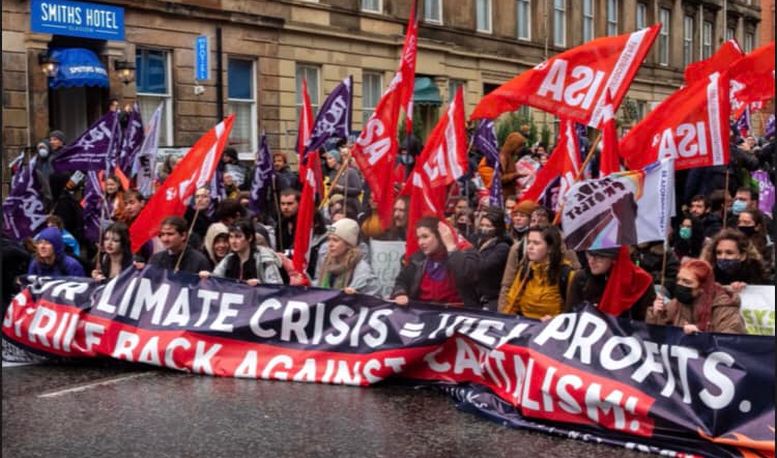Philip Chmel is a member of Linkse Socialistiche Partij / Parti Socialiste de Lutte (ISA in Belgium).
How to Fight Back to Win
At the COP27 climate conference in Sharm el-Sheikh in Egypt, the world’s ruling elites showed once again that they are absolutely incapable of protecting humanity and this planet from the climate catastrophe into which they and their capitalist system are driving us.
It seems like they are even getting tired of keeping up the facade: While Egypt’s dictatorial regime made headlines for repressing climate and social justice activists, around 400 private jets landed in Egypt during the conference and 636 delegates with ties to the fossil fuel industry participated at this year’s COP27. For the first time oil and gas companies were invited to participate in official events, turning the summit into a “gas trade fair.”
Instead of attending the greenwashing conference, Greta Thunberg stated clearly what is objectively necessary: to overthrow the “whole capitalist system.”
Scapegoating and empty agreements in the face of rising emissions
Just before the COP27 kicked off, the 2022 UN Emissions Gap Report was published, stating that there is “no credible pathway to 1.5C in place”. During the conference itself, scientists announced that “global carbon dioxide emissions from fossil fuels are projected to increase by 1% in 2022, hitting a new record of 37.5 billion tonnes.” And earlier this year, the World Meteorological Organization (WMO) released a climate update that says there is a 50% risk that the planet will temporarily cross the critical 1.5°C mark of global heating within the next five years. As we wrote in May this year, “to stand a remote chance to stay below 1.5°C in the long term, carbon emissions would need to be cut in half by 2030, but the opposite is the case, they are projected to rise by 14%.” While the catastrophic impacts of exacerbating climate crisis are already affecting millions across the world, a study by Science stated that “exceeding 1.5°C global warming could trigger multiple climate tipping points”.
The conference has been widely criticized for its blatant lack of any concrete measures to bring down emissions. Instead, many discussions actually revolved around watering down plans and agreements from past climate conferences. Even the ruling class and the bourgeois press don’t attempt to greenwash the fact that the conference was an absolute failure in that regard. Rather, western countries try to avert blame by pushing the false narrative that the barrier to successful climate protection are countries like China, UAE or Saudi Arabia. However, this is a cheap charade, and an outright lie. The US, Canada and Australia are among the countries with the highest subsidies for fossil fuels per capita and among those with the biggest fossil fuel expansion plans. Europe is trying “to turn Africa into its gas station”.
To keep face, the agreed “loss and damage” fund to support developing countries to cope with climate disasters has been celebrated by many as “historic”. However, the world leaders neither agreed who will pay into that fund nor which countries will be the beneficiaries. Notwithstanding the possibility for some cosmetic payments, this fund will most likely be yet another soon to be broken climate promise. As ISA recently wrote: “In 2009 richer countries (note not the polluting and profit-rich corporations) committed to provide $100 billion a year, by 2025 the International Institute for Environment and Development expects only $21.8 billion a year.”
More and more young people and workers around the world are drawing the conclusion that the capitalist system, of which neocolonial and imperialist exploitation are key components, is causing the destruction of our planet and that we can therefore have no trust in world leaders and their toothless, greenwashing UN conferences.
In order to have a fighting chance of limiting global warming to 1.5°C, the climate and workers’ movement need a united, common program — with demands including the nationalization of the transport and energy sector under democratic control, free public transport and higher wages — and to build a broad and coordinated strike to enforce the necessary changes.
Retreat from mass movement towards small-scale blockades
The mass demonstrations of the past years — the high point being the gigantic climate strikes of September 2019, when in one week 7.6 million people participated in climate actions around the world — had big ideological effects. However, they have not brought about the large-scale climate protection measures that are objectively necessary. As a result of this and the growing disillusionment with the potential for change under capitalism the climate movement is testing out different methods of direct action.
Many of those are aimed primarily at creating attention via spectacular action, calling on governments to act. One of the most widely used methods of activists across different countries has been the blocking of large highways or bridges, often by gluing or cementing themselves to the pavement. Recently, several activists made headlines by targeting, without harming, famous pieces of art or blocking private jets. In October, activists blocked private jet terminals at 14 airports in 13 countries. Involved in the private jet blockades were also members of the group Scientist Rebellion, a loose network of more than 1200 scientists from 26 countries.
Another type of direct actions are the school and university occupations that have emerged in the last weeks across different countries under the name End Fossil: Occupy. The mood is in full support of “system change”, with many clearly anti-capitalist slogans and placards. The demands range from divesting university funds from fossil fuel companies to the expropriation of German energy company RWE and the socialization of energy production. Many groups link up the climate and the cost-of-living crisis.
The common answer against direct action climate protests — whether school occupations or blockades — are increasing repression and slander. In Bavaria Germany for example, police arrested 12 climate activists who had blocked traffic in the past — pre-emptively, for 30 days without trial — solely based on the assumption that they might block traffic in the future. Forbes featured an article titled “Activists Or Terrorists: Protestors Shut Down Airport” that suggests that climate activist groups like Last Generation in Germany are “a threat to “free domestic order” or a future Baader-Meinhof gang or Red Army Faction”. This article is not an exception, the US listed climate activists shutting down pipelines with non-violent direct action as extremists alongside white supremacists and Britain features Extinction Rebellion on their counter-terrorism list.
Socialists and climate activists need to push back against such repression. At the same time however, and notwithstanding the fact that the genuine feeling of despair and the wish to do something is understandable and many of these activists act courageously, it is important to point out the limitations of these forms of activism.
These actions by small groups of individuals generally do not contribute to building the mass social forces that can put enough pressure on capitalist governments or local institutions to implement the most necessary measures. Moreover, actions like blocking traffic, when done in isolation from a mass movement or not as part of a labour struggle, have little to no impact on the capitalists. In fact, they can often alienate many working class people, creating further barriers to the kind of united action between the climate movement and the organized working class that is so necessary. When activists from the group Just stop oil blocked several roads in London on October 29 this year, working class people stuck in traffic dragged them away after asking them to move aside. One driver explained: “You are stopping the wrong people, I’ve got to go pick my kids up, I’ve got to get my lorry back to work. We can’t help you, go to Westminster.”
Solidarity action to unite the climate and workers movement
Direct action can be a powerful tool, especially when workers collectively join in by going on strike, as this hits the profits of the bosses. We need to build joint mass direct actions of the climate movement and the organized working class, for example combining strike action of workers of polluting sectors with blockades of fossil fuel infrastructure.
It is positive that many climate groups have already started to reach out to and coordinate with workers. In Austria in 2021, the group Lobau bleibt started the occupation of a construction site for an environmentally destructive city highway. They got in touch with the construction workers, invited them to meetings and collected donations for a “lost wages fund” to compensate for the wages bosses withheld from contract workers for the time construction was blocked. This year, activists from System Change not Climate Change and Fridays for Future supported the striking rail workers in Austria in their fight for higher wages, and climate activists in Belgium expressed their solidarity with the striking oil refinery workers in France.
In Britain, the climate activist group “Just stop oil” has come out in support of striking rail workers of the RMT union and together with other climate groups they supported oil refinery workers who went on strike at Fawley in Southampton as well as Great Ormond Street Hospital security staff in London and the recently sacked P&O workers. The group states: “This is the solidarity we need — like the kind shown between the miners and the queer movement in the 1980s.”
The workers’ and trade union movement is absolutely key for the fight against the climate crisis. However, it is unrealistic to expect the necessary steps to come from most of the union leaderships. Trade unions are heterogeneous in which the leaders usually have completely different lived realities than the rank and file or middle layer officials/functionaries. The trade union leaders’ material privileges often depend on good relations with reformist social democratic parties or even the bosses, which obviously shapes their politics. In general, they simply drag their feet and don’t put forward the action needed, but there are also some unfortunate examples where trade union leaders have actively joined with industry bosses against the climate movement, strengthening the false “jobs vs climate” argument.
To lay the basis for a united front of the climate and the workers’ movement, climate activists therefore need to address and organize with the rank and file.
With the initiatives Workers for Future in Austria and Climate Struggle is Class Struggle in Nuremberg, Germany (this article describes the campaigns in detail), ISA has done exactly that; by supporting social workers on strike and campaigning for the protection of jobs of Siemens workers, we built active links between the climate and the workers movement. We call on all climate activists to continue their efforts and to participate in the ongoing and coming strikes, union demonstrations and to make solidarity visits to picket lines.
In all these struggles, we should put forward the demand for nationalization under democratic workers’ control of the energy sector and other key parts of the economy such as transport, industry, finance and agriculture. Because to be able to effectively fight both the climate and cost-of-living crises, the working class needs to take the control of production out of the hands of the capitalists. In order to build the movement with the power to achieve such radical changes, we need a general strike movement of the organized working class, supported by the climate and other social movements and the youth.
Capitalism is dragging humanity to the brink of a climate catastrophe. The ruling class is incapable of ending the system’s dependence on fossil fuels. International democratic planning and cooperation based on public not private ownership — meaning a democratic socialist society — are the prerequisite for a healthy planet and human well-being.



